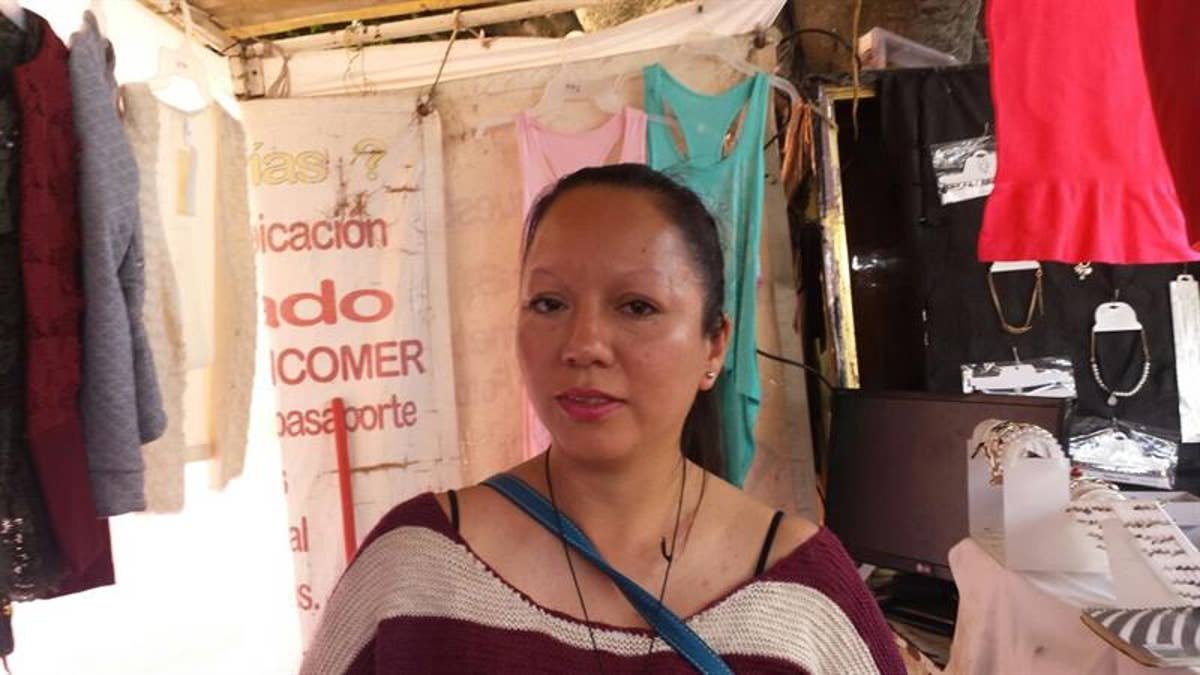
Guadalupe Garcia de Rayos, speaking with the media in Acambaro, Mexico, on Feb. 14, 2017. (EFE/El Correo de Guanajuato)
PHOENIX – In the face of rising deportations and detentions on the orders of President Donald Trump, the fight by the relatives of undocumented migrants often exceeds the ability of organizations, churches and neighborhoods, meaning that many immigrants must now fight their own battles to avoid being expelled from the U.S.
One example is Guadalupe Garcia de Rayos, the Mexican who recently was separated from her family in Arizona and deported to Mexico.
After living in the U.S. for 21 years, Garcia, an Arizona resident, was deported on Feb. 8 after being detained when she went to the Immigration and Customs Enforcement (ICE) office in Phoenix hoping that they would grant her time to continue appealing her case.
TRUMP PRAISES IMMIGRATION RAIDS, SCHUMER PRESSES FOR MORE INFO
She had been swept up in a 2008 immigration raid by then-Maricopa County Sheriff Joe Arpaio and accused of working under a Social Security Number belonging to someone else.
Also dealing with this new reality of toughened immigration policies is Jose Saul Garcia Santillan, of Chandler, Arizona, who last week was detained near his home by ICE agents.
Currently, Garcia is being held at the detention center in Eloy while his wife Margarita Lopez, with the help of neighbors, friends and the congregation of the Santa Maria church tries to mobilize to raise money to pay for an attorney.
"The ICE agents didn't come to the house, where he would have had more rights. They waited for him on the corner and the neighbors who saw the situation told me that the officials were in an unmarked car," Lopez told EFE.
The situation being experienced by the families of Garcia Santillan and Garcia de Rayos, both of whom have U.S.-born children, is desperate and reflects the new reality for thousands of migrant families fighting against the anti-immigrant - and unconstitutional, activists say - policies being implemented since Trump took office.
Carmen Cornejo, the director of the Lacey & Larkin Frontera Fund, told EFE that the organizations protecting civil rights have to be more alert because cases of immigrants' rights violations are on the rise.
ILLEGAL IMMIGRANT TAKES REFUGE IN DENVER CHURCH TO AVOID DEPORTATION
"Currently, ICE is violating individual rights systematically, acting without detention orders, what they're really doing is grabbing people off a list and arbitrarily taking action against them, which at first glance seems to be ... unconstitutional," she said.
Garcia Santillan's case, she said, shows the way in which ICE is acting against people who have a "slight" problem with the law, and who suddenly become the target of the deportation actions Trump announced during his campaign.
"They're grabbing people from lists ... they're combing through those registers to detain people who've had some problem, even if minor, even when they're not criminals," she said.
Lopez said that her husband had a U.S. work permit that he had renewed last September. Nevertheless, when immigration authorities detained him he didn't know that it had been suspended, never having received notification of that.
"A year ago he had a small problem with a soccer referee. In the altercation, my husband defended himself and pushed him, after which the police intervened. When he went to renew his work permit recently, they took his fingerprints again and then a criminal record came up for that problem, but they never denied him his permit," she said, adding that immigration officials "hunted" him down on the street corner near his home.
"All this that we're experiencing could be possible due to the changes in Trump's policies. Thank God that a lawyer told the judge that my husband will be defended and asked for bail. We're hoping that he'll have his hearing after he's out of jail," said Lopez, who is economically dependent on her husband.
Cornejo said that it is very important for people in a similar situation to have money saved and available to be able to hire an attorney quickly because ICE's modus operandi is to arrest and deport people as quickly as possible, without giving them time to do anything about it.
"Unfortunately, knowing your rights isn't enough," she said.









































